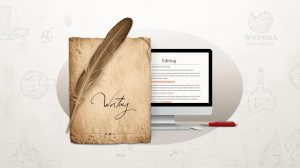1. Introduction
In 2025 the digital first world has reached a point where online reputation is often built or destroyed before people ever meet in person. Whether it is a multinational brand a startup or a public figure the first impression usually begins online. With billions of users relying on search engines for instant information credibility has shifted from traditional media to digital platforms. People now expect quick reliable and neutral information rather than scrolling through endless websites.
Among all online sources Wikipedia has become the “first stop” for reputation checks. When you search for a company celebrity or organization chances are high that a Wikipedia page will appear in the top results. For many this is where their opinion starts to form. Unlike advertisements or curated social media feeds Wikipedia is seen as an unbiased platform. Its open source nature combined with strict editorial standards gives it a level of authority unmatched by most websites.
The unique strength of Wikipedia lies in balancing accessibility and credibility. On one hand anyone can edit it making it democratic. On the other it enforces citation rules neutrality policies and community moderation ensuring accuracy. This mix has turned it into one of the most trusted online sources for identity verification and public reputation.
This article explores how Wikipedia shapes online reputation in 2025 focusing on three critical areas: building trust shaping brand perception and influencing search visibility. It also discusses the risks challenges and best practices that individuals and organizations must adopt to maintain a healthy digital identity.
2. The Authority of Wikipedia in 2025
A Global Knowledge Platform
By 2025 Wikipedia has cemented its position as a global knowledge hub attracting billions of monthly visitors. Its multi language accessibility makes it usable by people worldwide from students to policymakers. Unlike print encyclopedias Wikipedia is free dynamic and updated in real time. This constant evolution keeps it relevant in industries like technology business and politics.
Its open source model gives it inclusivity while its monitoring system maintains quality. Volunteer editors and automated bots work around the clock to ensure accuracy and remove vandalism. This hybrid model of human and AI moderation prevents misinformation from spreading unchecked.
Perceived Neutrality and Reliability
The real strength of Wikipedia lies in its widely accepted neutrality. Unlike corporate websites or branded social media profiles that often appear promotional Wikipedia is perceived as a more balanced and less biased platform. Its strict reliance on verifiable citations gives readers confidence that the information is supported by reliable third party sources rather than marketing claims. This citation driven credibility makes it a first choice reference point for students professionals journalists and everyday users seeking trustworthy knowledge.
Another unique factor is Wikipedia’s community driven editing system which acts as a built in safeguard. While anyone can technically make edits thousands of active contributors and moderators maintain a powerful network of checks and balances. This collective oversight prevents individuals or organizations from fully controlling the narrative. As a result being featured on Wikipedia has become synonymous with legitimacy whether for an entrepreneur a non profit organization or even a government body a dedicated Wikipedia page sends a strong global signal of credibility and recognition.
3. Building Online Trust through Wikipedia
Why People Trust Wikipedia
Trust is the foundation of online reputation and in 2025 Wikipedia has become a shortcut for credibility. People often trust Wikipedia more than official websites because it presents information in a neutral tone. On the other hand social media platforms are full of biased posts and manipulated narratives.
Psychologically a Wikipedia page acts as a first impression filter. If someone is searching for a professional or a brand finding them on Wikipedia creates a sense of legitimacy. Absence however may raise questions about their relevance or authenticity.
Reputation for Individuals & Organizations
For individuals having a page means being recognized as notable. For organizations it is proof of credibility and public recognition. A well structured page can increase media trust influence investors and reassure customers. For example when a journalist researches a public figure Wikipedia is often their first reference. Similarly investors evaluating a company may rely on Wikipedia for an unbiased overview. In this way Wikipedia acts as a reputation bridge between the digital public and professional stakeholders.
4. Wikipedia’s Role in Brand Perception
Balanced Information vs. Marketing Bias
In a world saturated with advertising people crave neutrality. This is where Wikipedia plays a major role. Unlike corporate PR pages Wikipedia does not allow promotional language. Its neutral tone ensures that information is seen as credible not marketing driven.
This objectivity makes users trust Wikipedia more than flashy ad campaigns or paid media. The mere presence of a brand on Wikipedia adds authenticity to its digital identity.
Positive and Negative Representation
The flip side is that Wikipedia also records controversies. Unlike marketing material negative events cannot simply be erased. For instance a brand involved in lawsuits or a celebrity linked to scandals will see those controversies reflected on their page.
This permanence creates a double edged sword. Positive pages build credibility but negative history is also preserved. In this way Wikipedia acts as a mirror of public perception not just a marketing tool.
5. Influence on Google Search Rankings
Wikipedia’s SEO Power
One of the strongest aspects of Wikipedia is its unmatched SEO authority which makes it a dominant force in shaping online visibility. Google consistently places Wikipedia pages among the top results largely due to the platform’s exceptional domain authority the reliability of its citation quality and the structured network of internal and external links.
In addition Wikipedia often appears in Knowledge Panels featured snippets and the People Also Ask section of search results. This constant visibility reinforces credibility and strengthens the overall reputation of the individual company or brand being searched.
Visibility Impact
For users seeing Wikipedia on the first page of Google creates instant trust. It also influences click through behavior. People are more likely to click on a Wikipedia link than an unknown site.
Additionally Wikipedia indirectly helps brand websites. While a company cannot link promotional content credible citations from Wikipedia strengthen its digital ecosystem giving it indirect SEO benefits.
6. Risks and Challenges of Wikipedia Reliance
Vandalism & Bias
Despite its authority Wikipedia is not immune to vandalism. False edits biased language or deliberate misinformation can damage reputations quickly. Public figures have often seen their pages targeted with malicious edits.
Notability and Deletion
Wikipedia enforces strict notability criteria. If a person or brand does not meet these standards their page can be deleted. Losing a page can harm credibility because it signals a lack of public recognition.
Limited Brand Control
Organizations cannot fully control their Wikipedia narrative. Unlike corporate websites they cannot delete negative content. This limited control is both the platform’s strength and a challenge for reputation managers.
7. Best Practices for Reputation Management
Ethical Wikipedia Engagement
Brands should avoid promotional edits and instead follow ethical guidelines. Violating Wikipedia’s rules can lead to page deletion and damage long term reputation.
Building Notability Beforehand
The best way to secure a page is by building notability through press coverage academic references and third party mentions before attempting to create or edit a page.
Monitoring and Responding
Reputation managers must monitor pages regularly. Using tracking tools and addressing edits promptly ensures misinformation is corrected before it spreads.
8. Future Outlook of Wikipedia’s Role
As we move forward Wikipedia’s role in reputation management is set to expand. With AI integration fact checking tools and voice search technologies Wikipedia will become even more central to digital identity.
In the coming years its database will likely be integrated with AI assistants search engines and educational platforms. This makes maintaining a credible Wikipedia presence not just optional but essential for online visibility.
9. Conclusion
In 2025 Wikipedia remains a cornerstone of online reputation management. It builds trust shapes brand perception and influences search rankings more than most other digital platforms. At the same time its challenges like vandalism notability issues and limited control require a careful approach.
For individuals and organizations the message is clear: a Wikipedia presence equals credibility but it must be earned ethically. Those who respect the platform’s guidelines and invest in building genuine notability will benefit the most.
Ultimately in a noisy digital age filled with marketing hype Wikipedia stands as a neutral voice of authority. That is why it continues to play a decisive role in shaping online reputation in 2025 and will likely remain vital in the years ahead.
Disclosure: We are a dedicated content marketing agency guiding small and medium businesses through their journey to the first page of Google.

Admin at Search Marketing Experts, publishing insightful blog posts on SEO, digital marketing, and strategies to help businesses grow online.

